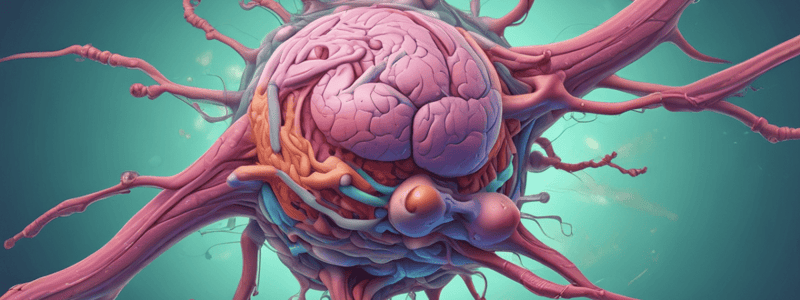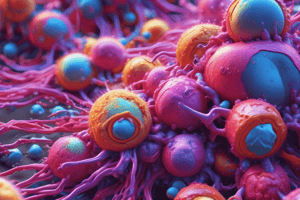Podcast
Questions and Answers
What is the process that immature T cells undergo in the deeper cortex?
What is the process that immature T cells undergo in the deeper cortex?
- Maturation
- Selection (correct)
- Differentiation
- Proliferation
What happens to the majority of T cells during the selection process?
What happens to the majority of T cells during the selection process?
- They enter a dormant state
- They mature and become active
- They undergo apoptosis (correct)
- They become immortal
Which organ is considered a primary lymphoid organ?
Which organ is considered a primary lymphoid organ?
- Spleen
- Thymus (correct)
- MALT
- Lymph nodes
What is the typical outcome for immature T cells that enter the outer cortex?
What is the typical outcome for immature T cells that enter the outer cortex?
What is one of the main functions of the lymphoid system?
What is one of the main functions of the lymphoid system?
What percentage of T cells typically survive the selection process?
What percentage of T cells typically survive the selection process?
Which of the following is NOT a secondary lymphoid organ?
Which of the following is NOT a secondary lymphoid organ?
Which type of cells does the lymphoid system help to eliminate?
Which type of cells does the lymphoid system help to eliminate?
Where do immature T cells initially enter?
Where do immature T cells initially enter?
How does the lymphoid system assist in waste disposal?
How does the lymphoid system assist in waste disposal?
What initiates the formation of lymphatic vessels in the body?
What initiates the formation of lymphatic vessels in the body?
Which statement accurately describes the role of lymphatic vessels?
Which statement accurately describes the role of lymphatic vessels?
What characteristic distinguishes lymphatic vessels from blood vessels?
What characteristic distinguishes lymphatic vessels from blood vessels?
Where do lymphatic vessels originate in the body?
Where do lymphatic vessels originate in the body?
What fluid is primarily carried by lymphatic vessels?
What fluid is primarily carried by lymphatic vessels?
What is the primary function of the thymus in the immune system?
What is the primary function of the thymus in the immune system?
Where is the thymus located in the human body?
Where is the thymus located in the human body?
What feature is associated with the thymus that contributes to its sterile environment?
What feature is associated with the thymus that contributes to its sterile environment?
Which characteristic does NOT describe the thymus?
Which characteristic does NOT describe the thymus?
Which type of immune cell primarily matures in the thymus?
Which type of immune cell primarily matures in the thymus?
What type of cells are found in the thymus that are involved in the immune response?
What type of cells are found in the thymus that are involved in the immune response?
What is the role of Hassall corpuscles in the thymus?
What is the role of Hassall corpuscles in the thymus?
What is the significance of the thymus being well-developed before birth?
What is the significance of the thymus being well-developed before birth?
What is the relationship between keratin and the thymus?
What is the relationship between keratin and the thymus?
How do age-related changes affect the thymus?
How do age-related changes affect the thymus?
Flashcards are hidden until you start studying
Study Notes
Lymphoid System
- The lymphoid system has two main types of organs: primary and secondary lymphoid organs.
Primary Lymphoid Organs
- Bone marrow is a primary lymphoid organ.
- Thymus is a primary lymphoid organ, located in the mediastinum.
- Thymus is where T cells mature, and it has a tight blood-thymus barrier with no afferent lymphatics.
- Immature T cells from bone marrow enter the outer cortex of the thymus and undergo proliferation.
- In the deeper cortex, T cells undergo rigorous “selection,” and only about 3% of T cells survive, while the rest are killed.
Secondary Lymphoid Organs
- Lymph nodes are secondary lymphoid organs.
- Spleen is a secondary lymphoid organ.
- MALT (Mucosa-Associated Lymphoid Tissue) is a secondary lymphoid organ.
Functions of the Lymphoid System
- The main purpose of the lymphoid system is to detect and eliminate unwanted substances, such as invading microorganisms, foreign materials, and cancer cells.
- The lymphoid system also carries waste products away from tissues and dumps them into the blood for disposal.
- Lymph travels through the body in lymphatic vessels, which begin as tiny open-ended vessels in tissues.
Age-related Changes in the Thymus
- The thymus is well-developed before birth.
Studying That Suits You
Use AI to generate personalized quizzes and flashcards to suit your learning preferences.




